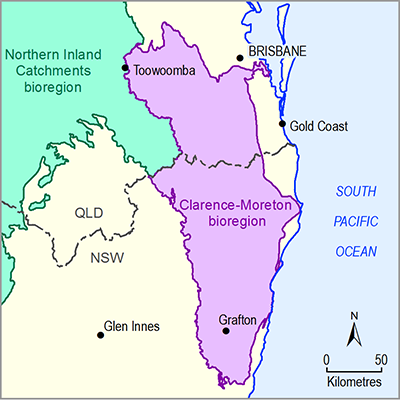- Home
- Assessments
- Bioregional Assessment Program
- Clarence-Moreton bioregion
- 2.6.2 Groundwater numerical modelling for the Clarence-Moreton bioregion
- 2.6.2.4 Boundary and initial conditions
Summary
General-head boundaries were implemented in the northern and southern sides of the groundwater model domain where the simulated aquifers continue beyond the model extents. Furthermore, a general-head boundary was implemented in parts of the eastern side of the groundwater model domain where it intersects with the Richmond River alluvium. The conductance of the general-head boundary was allowed to vary during the sensitivity and uncertainty analyses. Other parts of the model were assigned no-flow boundaries.
The long-term average recharge was estimated using chloride mass balance analysis. The point-scale estimates were upscaled, coupled with Australian Water Resources Assessment (AWRA) outputs and normalised to yield a spatially explicit time series of recharge, which was implemented using the MODFLOW Recharge package and varied via multipliers during the sensitivity and uncertainty analyses.
Perennial reaches of the Richmond River network were explicitly simulated using the MODFLOW River package by imposing stage-height time series derived from river-gauging sites. Estimates for the riverbed hydraulic conductivity and thickness were informed by the riverbed topography. Initial riverbed conductance was calculated using the two parameters along with river reach width and length. The initial values were adjusted with the aid of pilot points during the sensitivity and uncertainty analyses.
Other existing groundwater bores that were not drilled for coal seam gas (CSG) extraction were simulated using the MODFLOW Multiple Node Well package where the bores remained operational at a constant pumping rate equal to the current allocation during the entire simulation.

Product Finalisation date
- 2.6.2.1 Methods
- 2.6.2.2 Review of existing models
- 2.6.2.3 Model development
- 2.6.2.4 Boundary and initial conditions
- 2.6.2.5 Implementation of the coal resource development pathway
- 2.6.2.6 Parameterisation
- 2.6.2.7 Observations and predictions
- 2.6.2.8 Uncertainty analysis
- 2.6.2.9 Limitations and conclusions
- Citation
- Acknowledgements
- Contributors to the Technical Programme
- About this technical product
